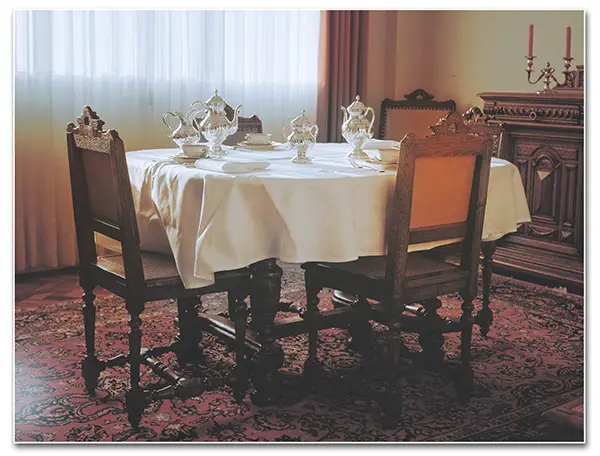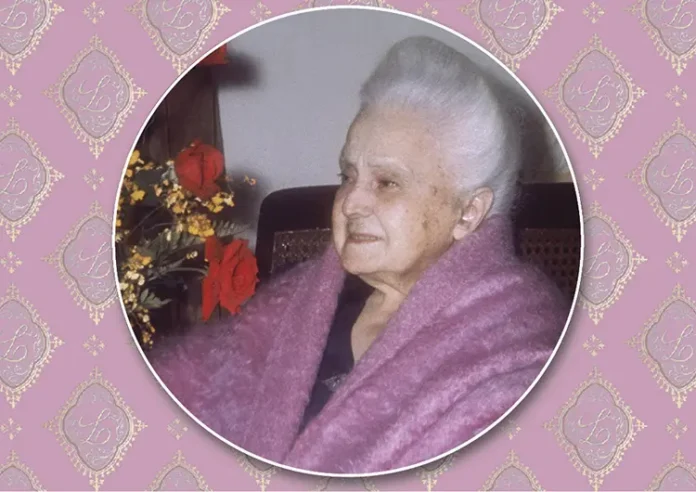The countless moral facets of the perfect mother were in Dona Lucilia put within reach of general observation, inviting others to become part of the “thousand children” for whom her overflowingly benevolent heart yearned.
Anyone who had the pleasure of visiting that apartment and spending time in the company of Dona Lucilia during the final months of her earthly existence was in a good position to evaluate the high degree of consideration, gentleness and esteem inherent to her noble manners, even in their simplest expressions.
Endowed with a respectful and affectionate character, she was a master in the difficult art of treating others with affable dignity, in a way which always made them feel at home.
With the noteworthy gift of causerie1 that she had inherited and enhanced, together with her gentle savoir-faire,2 she was most agreeable to listen to.
But even beyond all of these excellent qualities was a higher virtue: her readiness to listen, with tireless patience, to everything that others wished to tell her, always seeking the good sides of the facts narrated and, most especially, of her interlocutors.
One rarely finds, especially today, people willing to treat their visitors in this way.
Her own happiness depended on that of her neighbour
Because of her supernatural sense of compassion, it caused her acute suffering to see someone – even a stranger – saddened or slighted. The skill with which she immediately sought to apply the balm of the right word, the fitting expression, a good counsel in a difficult situation, solace in sorrow, and alms for those in need, was admirable.
Dona Lucilia’s own happiness depended on that of her neighbour…
Her soul was moved by the desire to make each person happy, which explains her deep regret when she could not do so. It was the affection of a totally and essentially Catholic heart. Her soul’s joy consisted in loving others for the love of God, and being loved by them.
However, when her goodwill was not reciprocated, she never succumbed to sentiments of bitterness, for she did not pursue personal benefit or advantage in these relationships.
Several people who were with Dona Lucilia during those afternoons of the five last months of her life witnessed these beautiful characteristics of her conduct. They were the objects of an affability invariably accompanied by benevolent and generous friendliness.
New habits disrupt the old routine of the home
After having accustomed herself to daily and prolonged isolation with nothing to disrupt her routine, Dona Lucilia was suddenly surrounded by unfamiliar sounds, voices and footsteps in her home.
Her telephone, almost silent before, began to ring repeatedly throughout the day. The doorbell rang more frequently…
The circumstances surrounding Dr. Plinio’s lengthy convalescence made it necessary for an attendant to remain on duty who would tactfully deal with any problems that might arise. It was a veritable public relations system, which Dona Lucilia, at her advanced age, could not possibly have imagined.
For this reason, she felt personally responsible for keeping a finger on what was happening.
A memorable invitation, followed by others
At the beginning of Dr. Plinio’s convalescence, the author of these lines, then a youth, felt the joy of being chosen as the attendant in his apartment.
One day, just as he put down the telephone receiver, he heard, from the dining room, the tinkling of a little bell followed by the strains of a short dialogue between Dona Lucilia and the housemaid:
“Yes, ma’am, you called me?”
“Who was it that telephoned?”
“I don’t know, Dona Lucilia. A man answered it.”
“Who is this man?”
“I’m not sure. It seems that he came to visit Dr. Plinio.”
“Go prepare some tea for this man and for me, because I will invite him to join me until Dr. Plinio wakes up.”
When the maid had withdrawn, Dona Lucilia continued her prayers. It was understandable that, as the lady of the house and gifted with a deep sense of responsibility, she felt obliged to entertain those who visited her son.
The bell rang a second time and when the maid came to the door, Dona Lucilia said:
“Would you kindly tell that man to please enter?”
As soon as he entered, Dona Lucilia greeted him cordially, and started the conversation as follows:
“You must be waiting for Plinio, aren’t you? I would like to tell you something: he has some friends who esteem him very much, and sometimes they invite him to go with them for a few days to a ranch, close to Amparo. And do you know what happened? While he was there, Plinio was walking where the ground was very irregular and stony and he twisted his ankle. He was immediately attended by his friends, but the doctors who later examined him recommended much rest…”3
After this explanation, Dona Lucilia, with her art of placing the visitor entirely at ease, continued:
“Because of this, Plinio will still be a while – you will have to wait longer than you imagined… But, while you wait for him, may I have the pleasure of your company? Would you like some tea?”
“Please don’t go to the trouble!”
“Perhaps you don’t like tea and would prefer coffee with milk, or something else…”
It was impossible for the young man to refuse. Dona Lucilia then rang the little bell and ordered the maid to bring tea and cookies.
This scene – evocative of the douceur de vivre4 of old – would from then on be repeated every day. Each time, Dona Lucilia would exercise her invariable and genteel hospitality.

The table set for tea, in the dining room of her apartment
Cherished months
She led conversations with simple and charming decorum. With all of her 91 years, she did not seek to speak of herself, or her past or present difficulties.
In fact, at a certain point she would observe a thoughtful pause that was both noble and distinguished. It was her way of allowing the other person to introduce a topic, for she was always willing to speak about whatever the other preferred.
It was an excellent occasion to observe her harmonious way of approaching topics that sought, first and foremost, to satisfy the legitimate wishes of her visitor.
In those happy and unforgettable conversations with Dona Lucilia, her visitor frequently asked her questions about her children, for the sheer delight of hearing her describe episodes from her family life. Indeed, this was a theme which, had she not been prompted, she would never have hinted at.
Those were cherished months, during which it was possible to learn numerous details of Dona Lucilia’s long life, narrated directly by her. ◊
Taken, with minor adaptations, from:
Dona Lucilia. Città del Vaticano-Nobleton: LEV;
Heralds of the Gospel, 2013, p.623-632
Notes
1 From the French: pleasant conversation.
2 From the French, literally: to know how to do. An expression used by the French to describe the ability to achieve good results in what one does.
3 Due to her advanced age, Dona Lucilia was not told the true state of Dr. Plinio, who was suffering from a serious diabetes crisis.
4 From the French: the sweetness of life.


